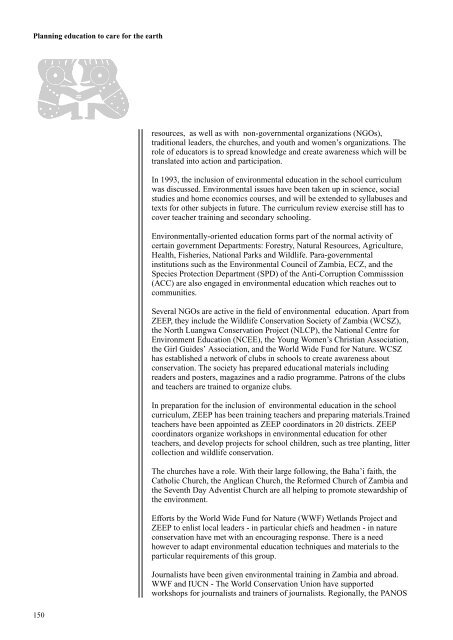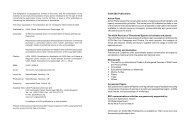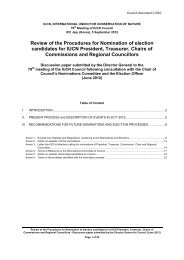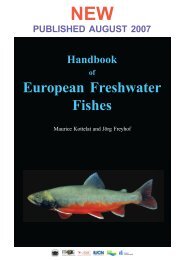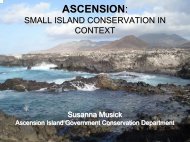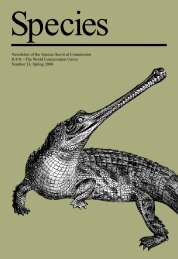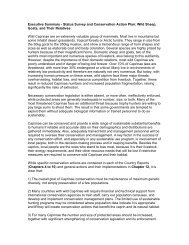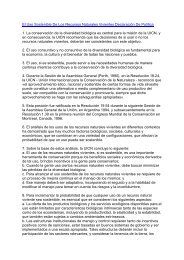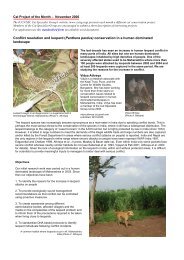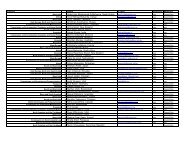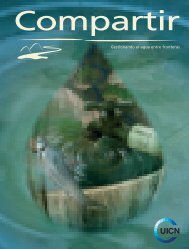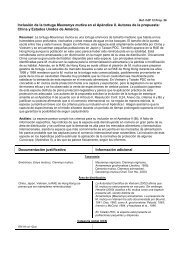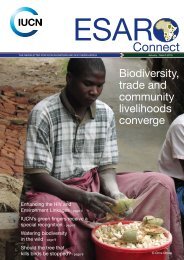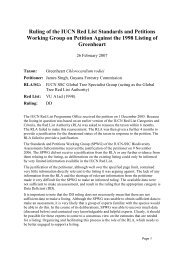Planning education to care for the earth - IUCN Knowledge Network
Planning education to care for the earth - IUCN Knowledge Network
Planning education to care for the earth - IUCN Knowledge Network
Create successful ePaper yourself
Turn your PDF publications into a flip-book with our unique Google optimized e-Paper software.
<strong>Planning</strong> <strong>education</strong> <strong>to</strong> <strong>care</strong> <strong>for</strong> <strong>the</strong> <strong>earth</strong>resources, as well as with non-governmental organizations (NGOs),traditional leaders, <strong>the</strong> churches, and youth and women’s organizations. Therole of educa<strong>to</strong>rs is <strong>to</strong> spread knowledge and create awareness which will betranslated in<strong>to</strong> action and participation.In 1993, <strong>the</strong> inclusion of environmental <strong>education</strong> in <strong>the</strong> school curriculumwas discussed. Environmental issues have been taken up in science, socialstudies and home economics courses, and will be extended <strong>to</strong> syllabuses andtexts <strong>for</strong> o<strong>the</strong>r subjects in future. The curriculum review exercise still has <strong>to</strong>cover teacher training and secondary schooling.Environmentally-oriented <strong>education</strong> <strong>for</strong>ms part of <strong>the</strong> normal activity ofcertain government Departments: Forestry, Natural Resources, Agriculture,Health, Fisheries, National Parks and Wildlife. Para-governmentalinstitutions such as <strong>the</strong> Environmental Council of Zambia, ECZ, and <strong>the</strong>Species Protection Department (SPD) of <strong>the</strong> Anti-Corruption Commisssion(ACC) are also engaged in environmental <strong>education</strong> which reaches out <strong>to</strong>communities.Several NGOs are active in <strong>the</strong> field of environmental <strong>education</strong>. Apart fromZEEP, <strong>the</strong>y include <strong>the</strong> Wildlife Conservation Society of Zambia (WCSZ),<strong>the</strong> North Luangwa Conservation Project (NLCP), <strong>the</strong> National Centre <strong>for</strong>Environment Education (NCEE), <strong>the</strong> Young Women’s Christian Association,<strong>the</strong> Girl Guides’ Association, and <strong>the</strong> World Wide Fund <strong>for</strong> Nature. WCSZhas established a network of clubs in schools <strong>to</strong> create awareness aboutconservation. The society has prepared <strong>education</strong>al materials includingreaders and posters, magazines and a radio programme. Patrons of <strong>the</strong> clubsand teachers are trained <strong>to</strong> organize clubs.In preparation <strong>for</strong> <strong>the</strong> inclusion of environmental <strong>education</strong> in <strong>the</strong> schoolcurriculum, ZEEP has been training teachers and preparing materials.Trainedteachers have been appointed as ZEEP coordina<strong>to</strong>rs in 20 districts. ZEEPcoordina<strong>to</strong>rs organize workshops in environmental <strong>education</strong> <strong>for</strong> o<strong>the</strong>rteachers, and develop projects <strong>for</strong> school children, such as tree planting, littercollection and wildlife conservation.The churches have a role. With <strong>the</strong>ir large following, <strong>the</strong> Baha’i faith, <strong>the</strong>Catholic Church, <strong>the</strong> Anglican Church, <strong>the</strong> Re<strong>for</strong>med Church of Zambia and<strong>the</strong> Seventh Day Adventist Church are all helping <strong>to</strong> promote stewardship of<strong>the</strong> environment.Ef<strong>for</strong>ts by <strong>the</strong> World Wide Fund <strong>for</strong> Nature (WWF) Wetlands Project andZEEP <strong>to</strong> enlist local leaders - in particular chiefs and headmen - in natureconservation have met with an encouraging response. There is a needhowever <strong>to</strong> adapt environmental <strong>education</strong> techniques and materials <strong>to</strong> <strong>the</strong>particular requirements of this group.Journalists have been given environmental training in Zambia and abroad.WWF and <strong>IUCN</strong> - The World Conservation Union have supportedworkshops <strong>for</strong> journalists and trainers of journalists. Regionally, <strong>the</strong> PANOS150


